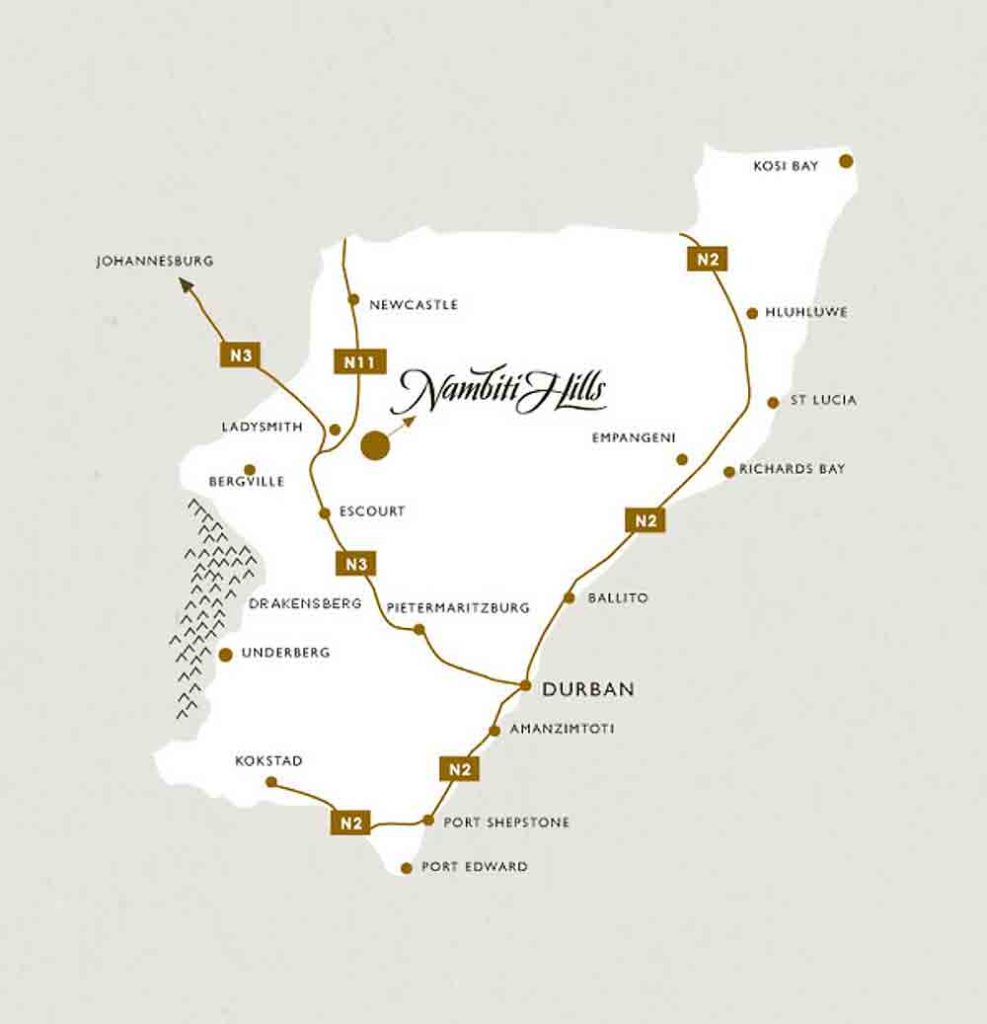NAMBITI PRIVATE GAME RESERVE
Areas of Operation
Wildlife Economy
Ecotourism
Biodiversity Stewardship
Protected Areas
Engagement with the KZN Biodiversity Stewardship Programme began in late 2009 and the site was assessed in 2010. It qualified to be proclaimed as a nature reserve, the highest level of protection available in the stewardship programme.
The Senzo’kuhle Nkos’uNodada Communal Trust and its beneficiaries benefit from Nambiti Private Game Reserve in several ways, including:
- Through payment of the lease fee by Nambiti Private Game Reserve (Pty) Ltd.
- Ownership and operation of Springbok Lodge and another undeveloped lodge site.
- Sharing in the profits earned by the operation of the reserve – i.e. hunting, live off-takes and sales of venison.
- Preferential employment within the reserve.
Nambiti Private Game Reserve is of significant biodiversity and ecological value, which led to it qualifying to be proclaimed as a nature reserve in terms of the KZN Biodiversity Stewardship Programme. Because of this, it contributes to several important targets for biodiversity conservation in KwaZulu-Natal and South Africa. Nambiti Private Game Reserve is a 9 859 hectare Big 5 reserve in Kwa-Zulu Natal. The reserve was established in 2000 by a group of businessmen led by Rob Le Sueur, on old cattle and maize farms that were combined to form a property extending over 8 000 hectares. Following this, more farms were purchased, bringing the reserve to its current size. Subsequently, the reserve was subject to a successful land claim and is now owned by the Senzo’kuhle Nkos’uNodada Communal Trust.
In April 2009, a successful management lease was established between the land claimants and the previous landowners. The lease is a 35-year lease with an option to renew for a further 35 years.
Operations at Nambiti Private Game Reserve are multi-faceted, combining 10 luxury game lodges catering to local and international tourists, limited hunting, live capture, and sale of game and more recently, the production of venison from a recently constructed abattoir and butchery. Nambiti Private Game Reserve has been proclaimed as a nature reserve, through the KZN Biodiversity Stewardship Programme, in terms of Section 23 of the National Environmental Management: Protected Areas Act (No.57 of 2003).
Nambiti Private Game Reserve is a successful wildlife ranching venture with significant biodiversity values. It provides an interesting model of cooperation between a local community and the private sector and is a significant regional employer. The project has resulted in the following achievements:
- Contribution to biodiversity and protected area expansion targets through proclamation as a nature reserve, the protection of habitat that is under-represented in the protected area system and protection of several rare and threatened species.
- A monthly turnover above R4 million has significant implications for the local and regional economies.
- Employment of 54 people in reserve operation and management and over 170 people in the reserve’s lodges, meaning that over 220 people are employed at the reserve.
- Revenue generation through live game sales and limited trophy hunting.
- Sustainable production of game meat for commercial sale, including the provision of an important local source of affordable meat to the communities living around the reserve.
Nambiti Private Game Reserve demonstrates the value and sustainability of a well-run wildlife ranching venture that integrates biodiversity conservation with significant socio-economic value. The benefits of the reserve include job creation, economic development and improved food security in an area with substantial poor rural communities that suffer from high levels of unemployment and limited economic opportunities.
Article source - Greg Martindale











